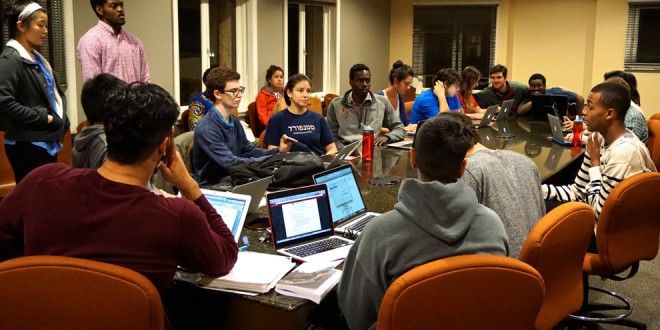Participation in student government at Stanford should be driven by a commitment to public service and a desire to serve the student body. As a result, Associated Students of Stanford University (ASSU) should henceforth refrain from compensating Senators and cabinet members and instead redirect those funds to the discretionary use of Stanford’s Diversity and First-Gen Office. Additionally, the title of ASSU “senator” should be changed to “student council representative.”
Sign the petition here.
This year, the ASSU will dole out $16,000 in salaries for senators. The Senate Chair and Appropriations Chair will both receive a considerable $1500 and each Senator, $1000. Along with these hefty checks, the Senate receives an additional “discretionary fund” of $14,000 for its personal piggy bank. Cabinet members are not starved for cash either. While the Review hasn’t yet been able to obtain updated numbers, in 2011, the president of the ASSU was paid $8250 and the vice-president, $8500.
In short, the ASSU execs received comparable salaries to your beloved freshman RA — who spent hours planning scavenger hunts, cleaning up vomit, and listening to residents complain about their first B. This is unjustifiable.
Senators should act like administrators, not kings. Financial compensation is not appropriate for student government representatives — especially considering that ASSU does not create anywhere near enough value to justify these salaries. Student government should attract those motivated by a desire for public service.
As a result, the Review has submitted a petition to eliminate all salaries for ASSU senate and cabinet members and redirect the funds to the discretionary use of the Diversity and First-Gen Office. Additionally, we propose that the position of ASSU Senator be renamed to “student council representative.”
ASSU members do insignificant work. Senators spend most of their time approving budgets — when most could be reviewed through petitions like the ones in the spring — and passing resolutions that have no binding effect. How is paying students to “debate” and pass a condemnation of Trump’s immigration policy — an issue on which nearly all students already agree and which will have precisely no impact — a prudent use of university funds? As for approving budgets, fund approval is not a political process and does not need to be conducted by an elected student body.
Though the Stanford Band, Talisman, and Challah for Hunger certainly do the university and the world much greater service than the ASSU, no Voluntary Student Organization (VSO) is allowed to compensate officers using student funds. This is logical and just — compensating student officers would ruin the spirit of voluntary service that characterizes these organizations. At last week’s ASSU meeting, senators rightfully spoke out against VSO officers receiving student-funded salaries. They would do well to apply the same logic to themselves. There is a reason RAs, PHEs, and RCCs receive a salary while VSO members do not: they provide an essential service and are accountable to resident fellows, residents, and Residential Education.
ASSU, on the other hand, lacks any serious accountability mechanism. By the time students vote for senators in the spring, the current slate has already been paid in full. Transparency is similarly in short supply. Even in the realm of budgetary decisions, where the ASSU exercises almost all of its meaningful authority, it has fallen short. Senators have failed to control the shady (if not out outright fraudulent) dealings of Stanford Student Enterprises (SSE), which manages a portfolio of over $18 million. A former ASSU President even vigorously advocated for an SSE CEO candidate with demonstrated conflicts of interest who resigned after allegations broke that he hired his girlfriend (paying her a salary of $70,000 a year) and engaged in unauthorized part-time startup work.
Of course, the ASSU should be accessible to students from all backgrounds. Rerouting the money to DGen would allow the office to set aside a portion of the funds to pay members of the ASSU senate and cabinet who display financial need but do not have time for work-study and an ASSU position. As of now, the cabinet and senate are not even compensated equally, and compensation certainly does not seem to reflect financial need. The university can do better.
Renaming the position and eliminating salaries would attract students who truly care about service rather than adding another line to their resumes or a wad of cash to their wallets. And it wouldn’t subsidize students from wealthy backgrounds at the expense of first-generation and low-income students who actually deserve the support. If ASSU senators run for office because they truly care about improving the welfare of their fellow students then compensation should be irrelevant. Student government participation should be driven by a commitment to public service and a desire to best serve the Stanford student body.
Therefore, the ASSU should stop compensating senators and cabinet members for activities of questionable importance and, instead, spend the money on students with real need. Helping low-income and first-generation students succeed at Stanford is infinitely more valuable than paying people to bicker in Nitery 209.
Correction: The Review claimed in an earlier version of this article that ASSU salaries were paid out of the student fee. Salaries are paid out of a separate endowment.
Additionally, the article originally stated that the Senate Chair received $2000 and all other Senators $1000. The updated numbers for 2016–2017 are $1500 for the Senate and Appropriation Chairs and $1000 for the remaining Senators.


